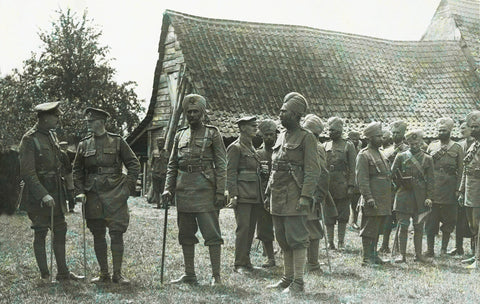
Sikh Voices from the Trenches of World War I
Thousands of Sikh soldiers fought and died for the Allied cause during World War I, yet their sacrifices have been sadly overlooked in written histories. In his book, Thousands of Heroes Have Arisen: Sikh Voices of the Great War 1914—1918, published by Helion & Company, author Sukwinder Singh Bassi sheds light on the courageous warrior spirit of the Sikhs as well as the struggles and hardships they faced.
“Bravery and heroism became synonymous with the Sikh name,” writes Bassi, who spent more than five years researching the book. The book includes a collection of Sikh letters and poetry from World War I, as well as thoughtful and enlightening insights into Sikh history and culture.
The Sikhs made up 20 percent of the British Indian Army’s strength when war broke out in 1914 and had fielded more than 100,000 men across global frontlines by the time the war ended. The story of their war is complex; many were enthusiastic to fight and, despite the hardships they faced, persisted in their loyalty to the British Empire, while others became disillusioned not only with the war itself but with the conditions their people faced under British colonial rule.
Sikhs fighting on the Western Front sometimes penned poetry which they sent to family and friends in addition to letters. In other cases, war poetry was published in local Sikh newspapers in India. Although Sikhs ostensibly managed these publications, they were still overseen by British colonial authorities. Thus most of the poems that appeared in local Sikh newspapers had pro-war tones.
The following poem was published anonymously in The Khalsa Advocate , a leading Sikh newspaper, on Saturday, May 8, 1915. It tells the story of a Sikh fighting on the Western Front. The poem references the main character’s wish to live up to the martial achievements of his ancestors who fought alongside the British, in this instance Sir Hugh Henry Gough, who was supported by Sikh fighters during the Indian Mutiny.
The narrator is ultimately portrayed as finding fulfillment in battle; this theme recurs in Sikh writings throughout the book. The poem also draws attention to hardships faced by the narrator’s family—it relates that his wife dies in childbirth while he is away at war. Could this detail have been included as a subtle reference to distressing living conditions that soldiers’ families faced in India? Or was the portrayal of a slain soldier reuniting with deceased relatives perhaps included to focus readers’ minds on the promise of the afterlife? In either case, the poem leaves much room for interpretation, and is an interesting example of literature circulated among Sikh readers during World War I.
Ram Singh In The Trenches
This new-fangled manner of fighting,
Goes sorely against my grain;
I loathe being down in these trenches,
Like a bandicoot-rat in a drain.
Not thus were the ways of my fathers,
When they fought for their country with Gough,
It was “Charge!” and a thousand brave fellows,
With a scream of defiance, were off.
I hate all this peeping and peering,
For a shot now and then at a head;
For me the fierce fight to a finish,
With thousands of wounded and dead.
The shells are screaming above me,
Like demons at odds for my soul;
I’m made for a rush at the gunners,
But I’m buried alive in this hole.
Yet amid all the roar and confusion,
The moon shines as sweetly on high;
As it shone that last evening in Jhelum,
When Mothi bade me good-bye.
Mothi, my beautiful Mothi!
I remember her pitiful face,
With the glistening tears in the moonlight,
As she held me in loving embrace.
I shrank from the journey before me,
I was held to the spot by her charms;
The Bugle! I summoned my courage,
And tore myself out of her arms.
A letter has reached me from Jhelum,
And the light has gone out of my life;
My Mothi’s dark hour was luckless,
And now I’ve neither babe nor wife.
I see her out there in the moonlight,
Down there by the temple tank—
What is this in my hand? It’s a rifle!
Where am I? My mind seems a blank.
What’s that? It’s a shell? I’ve been dreaming,
Another Lall Singh lies dumb!
But Mothi’s out there in the moonlight,
She’s calling me! Mothi, I come.
I leap with a scream from the trenches;
Like a fiend through the bullets I go.
Mothi!!! They think I am a devil,
As I leap in the midst of the foe.
Ah, this is real war—to be stabbing,
And screaming, and panting for breath;
The seventh! My Mothi, I’m coming!
Ah, this is real fighting; it’s…(death).
Truth
